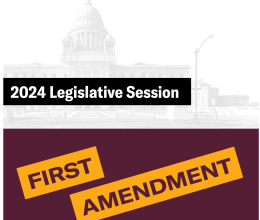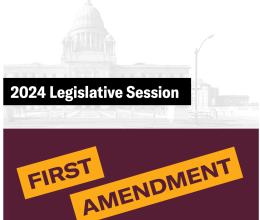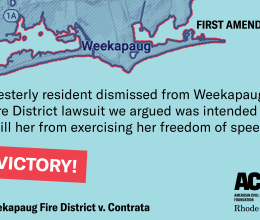A Providence ordinance signed into law today by Mayor Angel Taveras could have a significant and adverse impact on the advocacy activities of local community and non-profit organizations, the RI ACLU today claimed. The ACLU called the Act, “An Ordinance Relative to Lobbyist Registration,” well-intentioned, but said its far-reaching scope “will deter and chill robust community advocacy.”
The ordinance establishes a broad “lobbying registration” requirement on organizations, compensated individuals and volunteers who interact with city officials. Under the ordinance, any person deemed a “lobbyist” would need to register in advance with the City, obtain a photo ID and wear it any time while at City Hall or at other city offices, pay an annual registration fee of $25 (or $150 for larger organizations), and file quarterly lobbying reports. These individuals would also face potentially stiff fines for violations of the ordinance.
The ordinance applies to virtually any communication to just about any official of city government, including the Mayor, his staff, a City Council member, the police chief or the school superintendent. Further, in light of the broad definition of “lobbyist,” a large percentage of community groups in the City and their staff and volunteers could be subject to the requirements of this ordinance and its penalties.
Among the examples cited by the ACLU of the ordinance’s breadth:
- If an organization shares with a City Council member or any city official a report – such as the RI Kids Count Fact Book or an analysis that has been done on the prevalence of, say, homelessness in the city – for the purpose of seeking City action on that issue, the representative of that organization is “lobbying” and must register as a lobbyist. If the head of a community group writes a letter on behalf of the organization in support of or in opposition to any proposed ordinance or resolution or decision by a city official, he or she is “lobbying.” If an organization sends City Council members a copy of the group’s newsletter with the hope of attempting to affect their actions, “lobbying” has taken place.
- The ordinance’s definition of “lobbyist” applies to any paid employee, regardless of how incidental his or her “lobbying” activities are to his or her work. Making one phone call, writing one letter, urging one person to contact a city official turns that employee into a lobbyist. The definition also applies to the volunteers of a community organization, unless it is unincorporated or has 501(c)(3) tax-exempt status from the IRS. Even in those instances, volunteers are deemed lobbyists if they are provided any sort of reimbursement for expenses.
- The ordinance prohibits a person from engaging in any lobbying activity, as it is broadly defined, unless and until he or she has registered as a lobbyist. Thus, if a community group wants to immediately respond to an incident in the city or a news article about a pending City Council action by writing a letter to the Mayor or the City Council about it, the organization will violate the ordinance if it has not first registered with the City before sending the letter.
- The ordinance gives the city clerk virtually unbridled discretion to determine the penalties (which can amount to $250 a day) that will be imposed for violations of any aspect of the ordinance, and fails to specify any appeal mechanism to challenge those fines.
- Any person or organization found to violate any provisions of the ordinance could be punished not only by the imposition of fines, but also by being barred from engaging in any “lobbying” activity (e.g., writing letters, contacting a City Council member or urging others to do the same) for up to a year.
RI ACLU executive director Steven Brown said today: “Despite the good and sincere intentions underlying this proposal, we believe it will deter and chill robust community advocacy. We understand the City’s interest in promoting transparency in government, but this ordinance is not a proper way to achieve that goal.” Brown said that the ACLU would be talking with non-profit organizations affected by the ordinance’s passage about the possibility of mounting a legal challenge.
When the ACLU first learned about the ordinance last month, the organization sent a letter to the sponsor, Councilor John Igliozzi, raising various concerns about it. The ACLU heard nothing further until reading media reports this weekend of the ordinance’s final passage.




